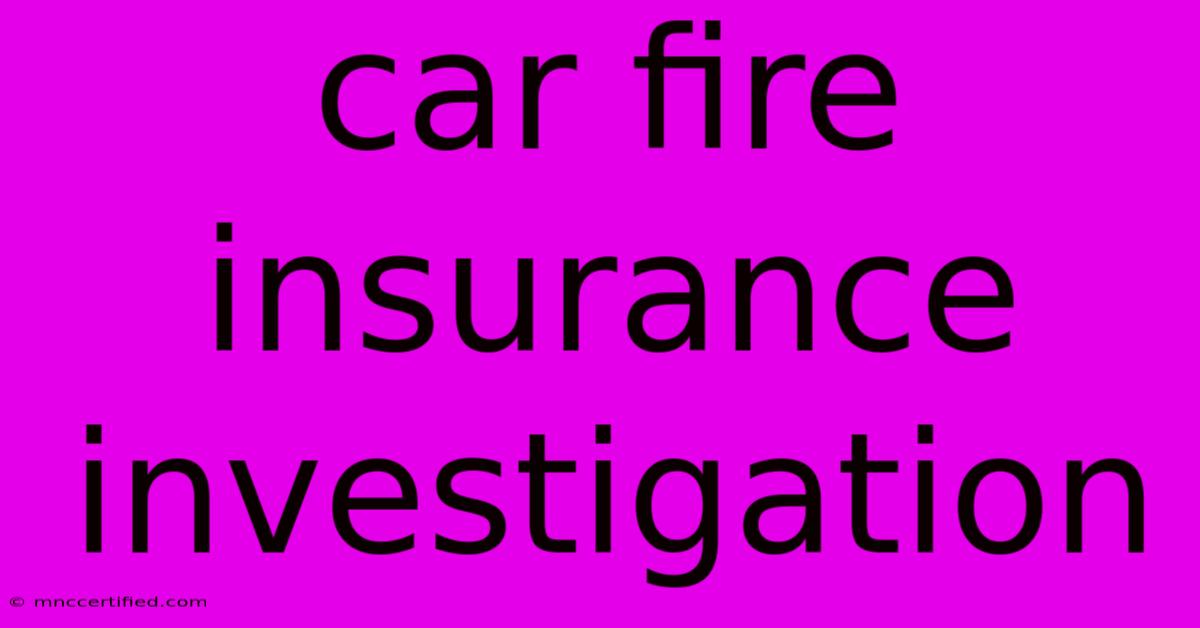Car Fire Insurance Investigation

Table of Contents
Car Fire Insurance Investigation: A Comprehensive Guide
Car fires are terrifying and devastating events. Beyond the immediate shock and loss, navigating the insurance claim process afterward can be incredibly complex. This guide will walk you through the car fire insurance investigation process, outlining what to expect and how to best protect your interests.
Understanding the Insurance Claim Process After a Car Fire
When your car is involved in a fire, your first priority is ensuring your safety and contacting emergency services. Once the immediate danger has passed, you'll need to initiate a claim with your insurance company. This typically involves:
-
Reporting the incident: Contact your insurance provider immediately. Provide detailed information about the fire, including the date, time, and location. Be prepared to answer questions about the circumstances surrounding the event.
-
Filing a claim: Your insurer will guide you through the claims process. This usually involves completing paperwork, providing documentation (e.g., photos, police reports), and potentially undergoing an investigation.
-
The investigation: This is the crucial stage where an adjuster will investigate the cause of the fire. They will analyze the damage, review police reports (if any), and potentially interview witnesses. The investigation's goal is to determine the cause and liability.
What Happens During a Car Fire Insurance Investigation?
The investigation process can vary depending on your insurer and the circumstances of the fire. However, here are some common aspects:
Scene Examination:
The adjuster (or a representative) will likely visit the scene of the fire to assess the damage. They will photograph the vehicle and the surrounding area, looking for clues about the fire's origin. They may also examine any remaining vehicle components.
Cause Determination:
Determining the cause of the fire is paramount. Common causes include electrical faults, fuel leaks, mechanical failures, arson, or even accidents involving other vehicles. The adjuster will meticulously investigate to pinpoint the root cause. They may consult with experts, such as fire investigators or mechanics, to reach a conclusion.
Documentation Review:
The adjuster will review all relevant documentation, including police reports, witness statements, and any maintenance records for your vehicle. This helps paint a complete picture of the events leading up to the fire.
Interviewing Witnesses:
If there were any witnesses to the fire, the adjuster may interview them to gather further information. Their accounts can be crucial in establishing the sequence of events and potential causes.
Vehicle Appraisal:
Once the cause of the fire is determined, the vehicle's damage will be assessed. This appraisal will determine the extent of the damage and the value of the vehicle before the fire. This is crucial in determining the settlement amount.
How to Prepare for a Car Fire Insurance Investigation
To ensure a smooth and successful claim, consider these tips:
-
Document everything: Take photos and videos of the damaged vehicle from multiple angles. Document any pre-existing damage.
-
Keep records: Maintain detailed records of all communication with your insurance company, including dates, times, and names of individuals you spoke with.
-
Be honest and cooperative: Provide accurate and complete information to the adjuster. Being forthcoming will expedite the process.
-
Seek legal counsel: If you suspect foul play or disagree with the adjuster's findings, consult with a lawyer specializing in insurance claims.
-
Understand your policy: Review your insurance policy carefully to understand your coverage and the claims process. Knowing your rights and responsibilities is essential.
Key Considerations and Frequently Asked Questions
Q: What if the cause of the fire is undetermined? This can complicate the claim process. Your insurance company may require further investigation or may partially or fully deny your claim depending on your policy.
Q: What if my car is a total loss? Your insurer will typically offer you the actual cash value (ACV) of your vehicle before the fire, minus your deductible.
Q: What if the fire was caused by a faulty part? Depending on the age of the part and your warranty, you may be able to pursue a claim against the manufacturer.
Q: Can I be penalized for filing a claim? Generally, filing a legitimate car fire claim won't affect your premiums, though this depends on your insurer and policy.
Successfully navigating a car fire insurance investigation requires preparation, clear communication, and a thorough understanding of the process. By following these guidelines, you can increase your chances of a fair and timely settlement. Remember, seeking professional legal advice is always an option if you face difficulties.

Thank you for visiting our website wich cover about Car Fire Insurance Investigation. We hope the information provided has been useful to you. Feel free to contact us if you have any questions or need further assistance. See you next time and dont miss to bookmark.
Featured Posts
-
Automobile Insurance Class Codes
Nov 21, 2024
-
Cma Awards Shaboozeys Whiskey Song
Nov 21, 2024
-
Your Guide To This Weekends Races
Nov 21, 2024
-
Jamey Miranda Sing For Strait 2024
Nov 21, 2024
-
Mitchell Prop Bets Pelicans Vs Cavaliers
Nov 21, 2024